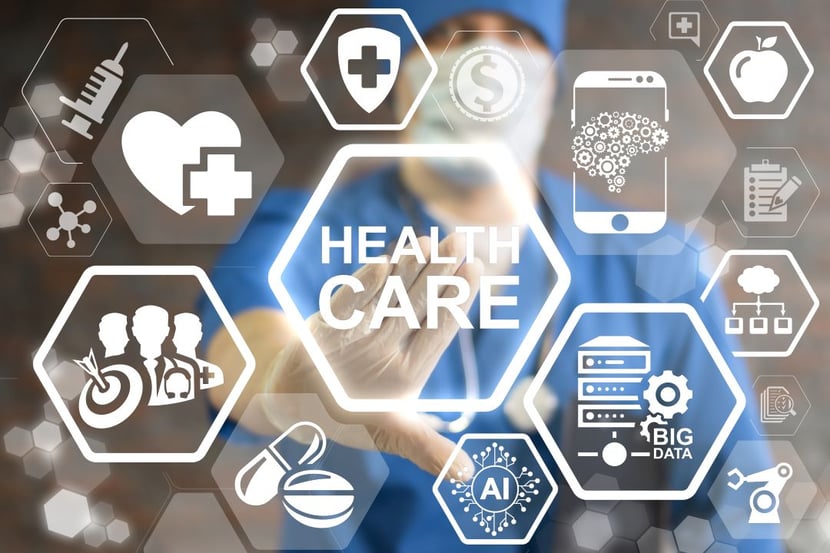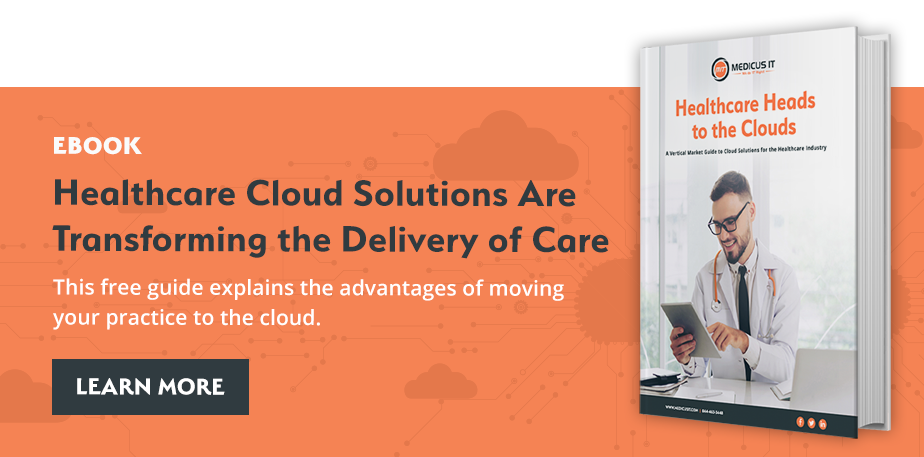
What do the COVID-19 pandemic and rapidly growing amounts of medical data have in common? Both are challenges facing healthcare practices today. In addition, both challenges — and many others — can be more effectively addressed by leveraging healthcare information technologies, such as database management, cloud computing, and machine learning.
In this blog, you will learn how such technologies can help your healthcare practice survive and thrive during these turbulent times. Here are four examples of healthcare information technology you should know.
1. Database management
Many people can remember when doctor's offices contained filing cabinets; they often took up an entire room. Now, in many cases, the documents once stored in these cabinets have become digitized. Unfortunately, digitized documents are often not fully or effectively organized or integrated with other databases. Such a lack of integration is one reason why usage of a database management system has become vital for healthcare organizations. Generally speaking, a database management system, sometimes referred to as a DBMS, is a technology solution that helps optimize the storage and retrieval of information from databases. These databases can include mission-critical, sensitive, and compliance data and records that grow over time.
There are several benefits to healthcare practices using a database management system. These include the following:
- Faster retrieval of records, which improves staff productivity.
- By providing a more comprehensive view of patients’ records, physicians can engage in more personalized and guided interactions with patients.
- Helping management of a practice better assess and understand physician activities and aligning them with the goals of the organization.
- Together with data governance, better ensuring data is available to the appropriate people.
2. Predictive analytics
The use of a predictive analytics solution enables healthcare professionals to find new insights into practice performance by understanding correlations and patterns within their data.
For example, predictive analytics can help practices better understand which of its patients are more likely to have certain conditions, thus allowing improvements in the management and delivery of care. Predictive analytics can extract data from various sources, including electronic health records, medical equipment, medical devices, and wearable technologies. Once the data is collected, practices can assess and clean their data — i.e., remove or modify data that is incorrect, irrelevant, duplicated, or improperly formatted. With cleaner data, practices can make better informed decisions that improve efficiency, save money, and reduce waste.
3. Cloud computing
Like other types of businesses, healthcare organizations are migrating to the cloud. The good news is the number of tools and services to help practices move to the cloud has grown, helping healthcare providers see the benefits of having their processes in the cloud. Working with a managed services provider can help you identify those processes that you can move to the cloud and which ones will offer a good return on investment.
While on-premise solutions were a logical choice in the past, storing the vast amounts of data coming into a practice is becoming expensive, increasingly less practical, and can leave a practice more vulnerable to cyberattacks. There are a variety of benefits for cloud computing in healthcare, including:
- decreasing or eliminating the cost of on-premise hosting;
- using updated technologies that can easily scale up or down as needed, depending on patient volume and flow;
- updates of systems performed by vendors; and
- improved accessibility.
Some other benefits of cloud computing include improved collaboration between various organizations, departments, and physicians. It allows medical providers to more easily share authorized data and improve collaboration.
Cloud computing allows healthcare organizations to improve data storage and data management. With all the data that they need to manage, cloud computing offers more scalable data storage than was available with physical servers and hardware.
When properly handled, cloud computing can increase security for healthcare providers as well. It can also help protect the data from on-site hardware failures and provide backups directly to the cloud.
Cloud computing can also help patients use their data as it democratizes data and gives patients better control of their health information. This democratization can help improve the patients' decision-making process and lead to better and more informed decision-making.
Finally, cloud computing offers ease of interoperability that is not available with traditional on-premise servers. This interoperability can allow authorized organizations to establish data integrations regardless of the origin of the data or where it is stored.
4. Machine learning
Machine learning holds great promise within healthcare. It can help identify diseases, monitor health pandemics, diagnose conditions, and improve efficiency with clinical trials and medical research. It can also save the healthcare system significant money. According to McKinsey & Co., healthcare organizations could save $100 billion annually by using big data and machine learning.
Machine learning holds promise in several areas, including the following:
Medical imaging diagnosis: Computer vision and machine learning can greatly improve medical imaging diagnosis. As machine learning becomes more accessible to the world, organizations will likely see machine learning algorithms review more data sources.
Disease diagnosis: Machine learning can help with identifying a disease and then diagnosing it. When used with medical imaging, machine learning can help identify and then diagnose diseases. Machine learning may enhance healthcare results for patients. It also holds promise in the discovery of new drugs and manufacturing.
Cancer treatments: Machine learning offers unsupervised learning. In this scenario, it will identify patterns within data without providing predictions. Projects like Microsoft's Project Hanover use machine learning in several initiatives. These include cancer treatments and personalized drug combinations for acute myeloid leukemia patients.
Personalized medicine: Traditionally, physicians were required to choose from a set of diagnoses or eliminate risks based on their history. Machine learning offers the opportunity of more personalized treatments that are designed for a patient's individual needs. Machine learning like IBM's Watson for Oncology can use a patient’s medical history and provide multiple options for treatment.
Continuous improvement
Healthcare is an industry undergoing rapid change. Information technology is playing an increasing role in helping practices respond effectively. As the examples of information technology in healthcare described above and others continue to improve, they will take on an even greater role in helping practices achieve their short- and long-term clinical, financial, and operational objectives.
Medicus IT is your trusted partner, in healthcare IT security and HIPAA Compliance. Contact us today to ensure your data is safe.

